Centre for Natural Resources and Environment
The Centre for Natural Resources and Environment (CNRE) conducts policy-oriented and academic researches, focusing on climate change, resource governance, energy, and environmental sustainability. The centre generates evidence-based knowledge through rigorous researches using various methods including integrated modelling techniques, social-ecological system analyses, economic experiments, surveys and in-depth qualitative analysis. The research findings are shared widely among local and international partners, practitioners, and policy makers through publications, policy dialogues, and dissemination workshops. Our researches provide reliable information and scientific evidence for decision makers to make relevant policies, especially contributing to the Royal Government of Cambodia’s rectangle strategies on Angle 4: inclusive sustainable development, sustainable management of natural resources and culture, ensuring environmental sustainability, and primitive response to climate change.

Development of ASEAN Climate Change Strategic Action Plan 2025-2030
Institute for Global Environmental StrategiesThe ASEAN Climate Change Strategic Action Plan 2025-2030 (ACCSAP) is expected to serve as a roadmap to accelerate the transition of ASEAN countries towards achieving the goals of their NDCs and long-term strategies and visions, co...
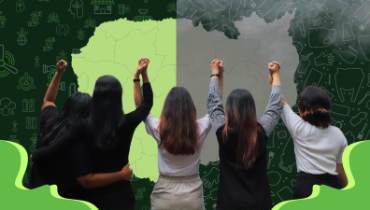
Gender, Livelihood and Climate Change in Cambodia
The World BankCambodia’s susceptibility to climate change is heightened by its limited ability to adapt. Women experience more pronounced consequences from climate change than men. As Cambodia strives to achieve carbon neutrality by 2050 amidst...

Opportunity Case 1: Climate Change, Livelihood and Migration
The Asia Foundation | Ponlok Chammes | Australia AidThe Ponlok Chomnes II program is a four-year program funded by the Australian Department of Foreign Affairs and Trade through The Asia Foundation's Ponlok Chomnes: Data and Dialogue for Development in Cambodia that aims to promote...
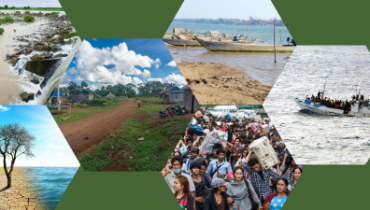
Impacts of Climate Change on Displacement Patterns in Kratie, Mondulkiri and Stung Treng Provinces, Cambodia
International Organization for MigrationLinks between climate change and migration in Cambodia need to be empirically substantiated. It is known that climate change poses a threat to agricultural production and impacts men and women in different ways in terms of a shift...
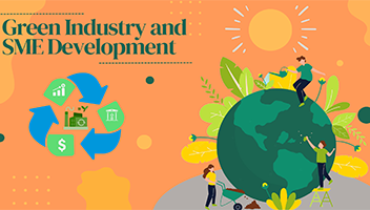
Green Industry and SME Development in Cambodia
AEM-METI Economic and Industrial Cooperation CommitteeGreen SMEs are small and medium-sized enterprises that operate environmentally and sustainably. In Cambodia, MSMEs (Micro-, Small and Medium-sized Enterprises) are the backbone of the economy and constitute more than 90 percent of...
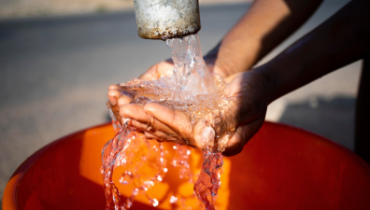
Strengthening Water Resources Management Planning Systems for Inclusive Climate Resilient WASH Services
Water for Women FundClimate resilient water safety planning (WSP) has commenced in Cambodia, and new guidelines have been developed by government agencies to inform and guide climate-resilient water resources management and water security. These two...
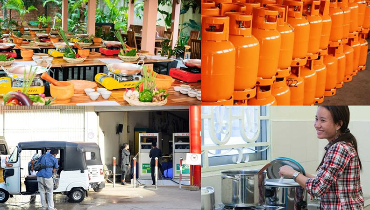
Survey on LPG Consumption Situation in Cambodia
The Economic Research Institute for ASEAN and East AsiaIn Cambodia, the source of fuel for households from liquefied petroleum gas (LGP) accounts for 56 per cent of urban settlements and 11 percent of rural residents, and it ranks second after firewood and charcoal. The source of elec...
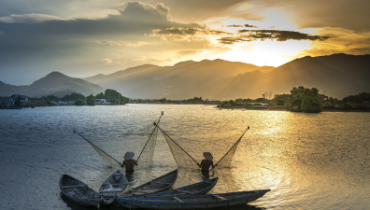
Mekong Thought Leadership and Think Tanks Network
The Department of Foreign Affairs and TradeThe Mekong Thought Leadership and Think Tanks Network Program will address the challenges related to water and energy in the context of climate change impacting the most vulnerable and marginalised in society in Mekong countries....
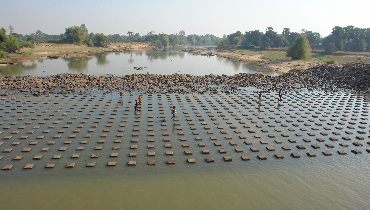
Asian Mega Deltas (AMD) Working Package 4 and Resilient Aquatic Foods in Food, Land and Water Systems (RAqFS) Working Pa...
International Water Management Institute (IWMI)The Asian Mega Deltas (AMD) program is one of the new OneCG initiatives that commenced in April 2022 and will run till at least 31 December 2024 (Phase 1). The One CG involves closer working modalities amongst the numerous CG Cent...
There is no data list!
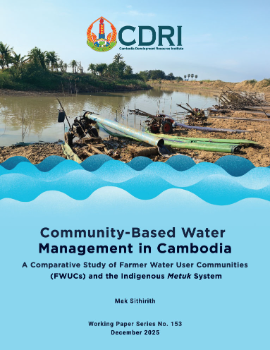
Community-Based Water Management in Cambodia: A Comparative Study of Farmer Water User Communities (FWUCs) and the Indigenous Metuk System
This working paper examines community-based water management in Cambodia through a comparative analysis of Farmer Water User Communities (FWUCs) and the indigenous Metuk system in the Tonle Sap floodplain. Drawing on qualitative case studies from Kakaoh Commune in Kampong Thom Province and Santey Village in Siem Reap Province, the study analyses governance design, legitimacy, ecological fit,...
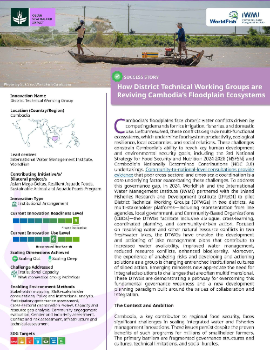
How District Technical Working Groups are Reviving Cambodia’s Floodplain Ecosystems
Cambodia’s floodplains face chronic water conflicts driven by competing demands for rice irrigation, fisheries, and domestic use. Left unresolved, these conflicts degrade multi-functional ecosystems, which undermine food system productivity, ecological resilience, local economies, and social relations. These challenges constrain Cambodia’s ability to reach key human development and environmental s...
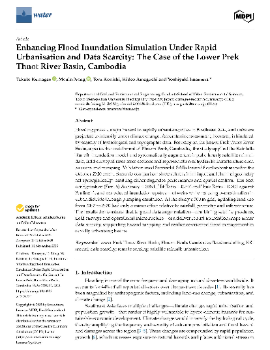
Enhancing Flood Inundation Simulation Under Rapid Urbanisation and Data Scarcity: The Case of the Lower Prek Thnot River Basin, Cambodia
Flooding poses a major hazard to rapidly urbanising cities in Southeast Asia, and risks are projected to intensify under climate change. Accurate risk assessment, however, is hindered by scarcity of hydrological and topographic data. Focusing on the Lower Prek Thnot River Basin, a peri-urban catchment of Phnom Penh, Cambodia, the study applied the Rainfall–Runoff–Inundation model and systema...
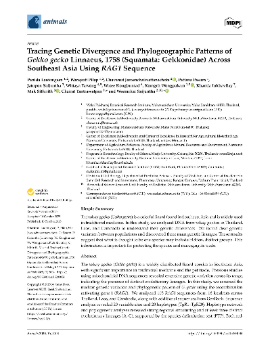
Tracing Genetic Divergence and Phylogeographic Patterns of Gekko gecko Linnaeus, 1758 (Squamata: Gekkonidae) Across Southeast Asia Using RAG1 Sequence
The tokay gecko (Gekko gecko) is a widely distributed lizard species in Southeast Asia, with significant importance in traditional medicine and the pet trade. Previous studies using mitochondrial DNA sequences revealed extensive genetic variation across its range, indicating the presence of distinct evolutionary lineages. In this study, we assessed the nuclear genetic variation and phylogenet...
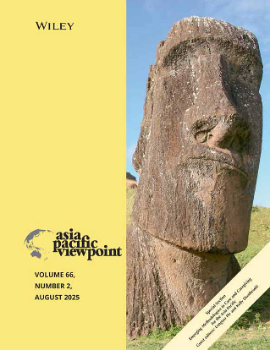
From Loss to Transformation? Towards Pluralistic and Politicised Agrarian-Climate Futures
Understanding how actors perceive and anticipate future states of the world is gaining traction in climate change governance scholarship and related calls for sustainability transformations. However, smallholder farmers, indigenous groups, and local communities, who are expected to bear disproportionate burdens of loss and damage from climate change, remain underrepresented in future-oriented...
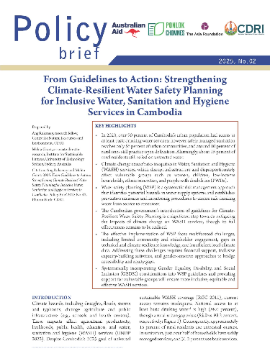
From Guidelines to Action: Strengthening Climate-Resilient Water Safety Planning for Inclusive Water, Sanitation and Hygiene Services in Cambodia
In 2023, over 90 percent of Cambodia’s urban population had access to at least basic drinking water services; however safely managed sanitation reaches only 56 percent of urban communities, and around 10 percent of rural ones still practice open defecation. Alarmingly, about 15 percent of rural residents still relied on untreated water.Climate change exacerbates inequities in Water, Sanitati...

Disentangling Community-Based Resource Governance Through Knowledge Systems Mapping: Insights from Community Fish Refuges In Rural Cambodia
Inland fisheries in Cambodia are of great importance to the livelihoods of rural communities, as they provide sustenance and seasonal income for the local population. Community fish refuges (CFRs) are natural or human-made water bodies that hold water throughout the year, providing a dry-season sanctuary for aquatic life. Managed mainly by the local community, CFRs support diverse ecological and h...

Why does rural resilience for climate-induced migration response matter?
Climate-induced migration in rural communities represents a growing challenge for Cambodia socioeconomic development. Climate change leads to water scarcity and adversely affects agricultural production, reducing farmers’ incomes and destroying livelihoods, thus making rural people more vulnerable. The income loss from crop damage caused by extreme weather events is one of the key drivers of migra...

Barriers to Nutritious Food Production and Consumption: Insights from Two Case Studies
This study investigates the barriers to nutritious food production and consumption in Cambodia’s Tonle Sap Lake floodplain and Mekong Delta, focusing on two case study sites: Boeung Ream Community Fish Refuge in Kampong Thom and Ta Soung Irrigation Scheme in Takeo. Using qualitative methods, including key informant interviews and focus group discussions, the research explores how socio-economic st...

Enhancing Rural Resilience for Climate-Induced Migration Responses
Key MessagesMigrants were mainly young adults, with men doing high-risk jobs like construction and women doing less risky jobs such as factory work. Migrant households’ livelihoods are affected by unpredictable weather conditions, reduced water availability, and extreme events like heatwaves, droughts and floods, which lowered crop yields and fish stocks. This led to income loss and financial inst...
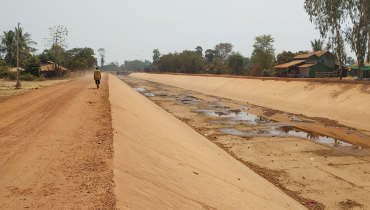
Cambodia’s Water Paradox: Why More Infrastructure Is Not Solving the Management Issue
Author: Dr SAO Davy, Visiting Fellow at CDRI’s Centre for Natural Resources and EnvironmentKey MessagesCambodia experiences a paradox of abundant water resources during wet seasons and severe scarcity in dry seasons, significantly undermining agriculture, infrastructure, and livelihoods. This highlights the critical need for improved water management.Despite substantial investments, Cambodia’s centralised and engineering-focused water management...
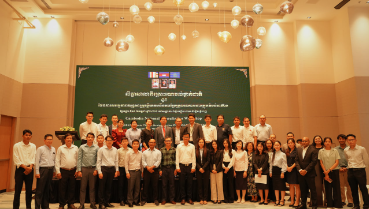
The ASEAN Climate Change Strategic Action Plan 2025-2030 (ACCSAP) Cambodia National Consultation Workshop
On 15 July 2025, the Cambodia Development Resource Institute (CDRI) jointly hosted the Cambodia National Consultation Workshop for the ASEAN Climate Change Strategic Action Plan (ACCSAP) 2025–2030 together with the Ministry of Environment. Organised in collaboration with the ACCSAP Secretariat (IGES), the event took place at Fairfield by Marriott, Phnom Penh The workshop brought together over 40 representatives from government agencies, CSOs, a...

Subnational Policy Dialogue: Strengthening Climate-Resilient and Inclusive WASH Services
Key Takeaways from the Subnational Policy Dialogue: Strengthening Climate-Resilient and Inclusive WASH Services On 3rd April 2025, CDRI successfully organised Subnational Policy Dialogue in Pursat Province, bringing together key stakeholders to discuss solutions for strengthening Water, Sanitation, and Hygiene (WASH) services at the local level in the face of climate change challenges. The discussions focused on policy implementation and cross-s...

Joint Field Work on Climate Resilient Water Safety Planning
Cambodia remains highly vulnerable to the impacts of climate change due to its heavy reliance on climate-sensitive sectors such as agriculture, water resources, forestry, fisheries, and tourism. These sectors form the critical foundation of Cambodia’s economic growth and support the livelihoods of a significant majority of its population. In response to this vulnerability, CDRI’s Environment Centre is actively engaged in research to strengthen wa...
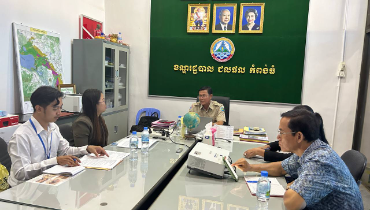
In-depth Fieldwork on "Grounded Case Studies of Asian Mega Delta Project Work Package 4 on The Resilient Aquatic Food in Food, Land, and Water Systems"
From 09 -18 January 2024, CDRI’s Environment Centre conducted an in-depth fieldwork project named "Grounded Case Studies of Asian Mega Delta Project Work Package 4 on The Resilient Aquatic Food in Food, Land, and Water Systems,” which focuses on the Mekong Delta provinces of Takeo and Kompong Thom to explore how formal and informal institutions manage land and water resources, ultimately impacting the multifunctionality of the landscape and its a...
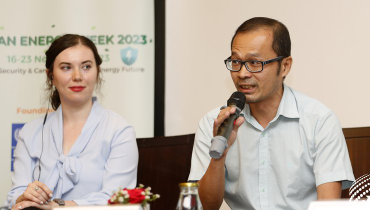
Panel Discussion on Addressing the Gender Dimension in Clean Energy Sector
Dr Ngin Chanrith, a Senior Research Fellow and Director of CDRI's Environment Centre, participated as a panelist in a discussion titled “Addressing the Gender Dimension in the Clean Energy Sector” during Clean Energy Week on November 20, 2023. The discussion highlighted the pivotal role women play in energy consumption and decision-making within their households, and their potential to significantly influence family energy expenditure.The discuss...
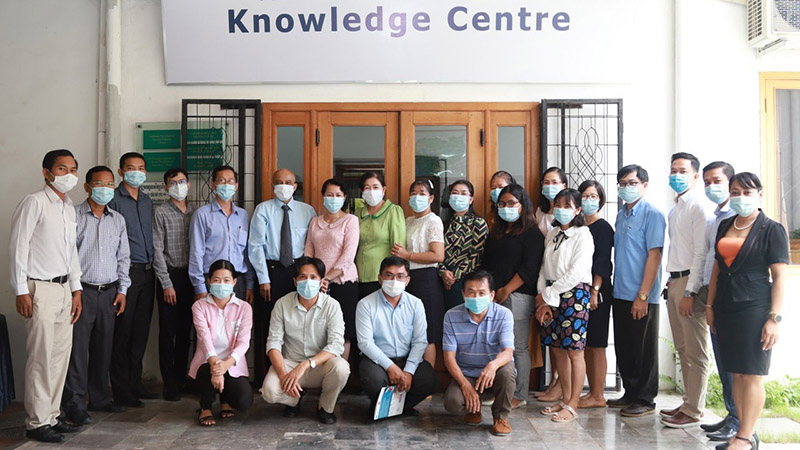
Kick-off Workshop for the Preparation of the State of Gender Equality and Climate Change
On July 15, 2020, the Center for Environment and Natural Resources hosted a kick-off workshop for the preparation of the State of Gender Equality and Climate Change Report. It was attended by 25 participants from UN Women, CDRI, Ministries of Environment, Agriculture, Rural Development, Women's Affairs, and Mines and Energy, and NCDD Secretariat, and Action Aids (CSO). The expected outcome is the national report would become “a tool” to raise awa...

10 Nov
Research Seminar
“I had no education. I had no experience. I had nothing.”: Understanding Non-expert, Citizen-led INGOs through Realist and Relational Lenses
11:00 AM - 12:00 PM
“How do the absent forms of expertise of citizen-led INGO leaders affect their rationales and modes of providing international aid?” This question will be addressed in our monthly research seminar on Friday 10 November 2023, from 11am to 12pm at CDRI Library and Zoom. This month, we will explore the topic “Understanding Non-expert, Citizen-led INGOs through Realist and Relational Lenses” and will combine realist and relationship approaches to pr...
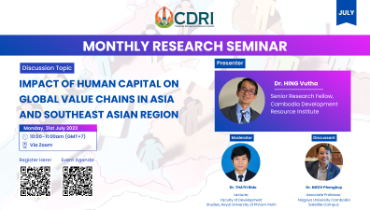
31 Jul
Research Seminar
Impact of Human Capital on Global Value Chains in Asia and Southeast Asian Region
10:00 AM - 11:00 AM
We are pleased to invite you to join our Monthly Research Seminar on the Impact of Human Capital on Global Value Chains in Asia and Southeast Asian Region which takes place on July 31st, 2023, from 10 AM - 11 AM (GMT+7) via Zoom. This seminar examines the relationship between human capital development and global value-chain (GVC) activities in East Asia and seeks to examine the impact of human capital development on domestic firm participation in...
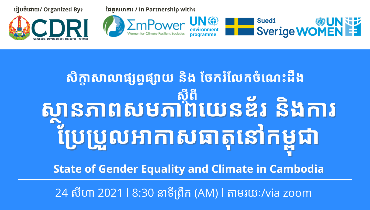
24 Aug
National Dissemination and Knowledge Sharing Workshop
State of Gender Equality and Climate Change in Cambodia
08:30 AM - 12:00 PM
Virutal
The purpose of this workshop is to i) disseminate result the study. ii) to present more evidence of the links between gender equality and climate change and analysing gendered impacts in the key adaptation and mitigation sectors; and iii) to provide country-specific recommendations about how to enhance gender responsive policy implementation and further bolster the integration of gender equality in climate-relevant policy areas.
